Disclosure: Meeple Mountain received a free copy of this product in exchange for an honest, unbiased review. This review is not intended to be an endorsement.
Let’s get one thing straight before we go any further:
Yes, Oceans: Legends of the Deep has flying whales.
No, they aren’t some secret branch of evolution that the government has kept hidden from you.
Yes, they are entirely fictional, fantastical and kinda funny.
Here’s the thing though: Legends of the Deep also features Ahuizotl. The rulebook and some internet searching tell me that Ahuizotl were a water dog from Aztec mythology that lured people to the water’s edge with the sound of a baby crying, grabbing them with a hand at the end of their tail to feast on their eyes, nails and teeth. Alex Shiga’s illustration of them is about as creepy as all that sounds.
I don’t know about you, but I’d never heard of the Ahuizotl before. I’d also never heard of the Finnish sea monster Iku-Turso, the Hawaiian guardian shark Ka’ahupāhau, the West African orisha spirit Olokun, or the Japanese yōkai Umibōzu. In fact, of the 17 myths and deities included in the expansion (along with seven entirely fictional entities), I knew of a grand total of three.
Much like the base game, then, Legends of the Deep is largely educational, with a few frivolous fabrications chucked in for fun.
It’s a shame that most people initially focussed on those damn flying whales…
Magical Myth-ery Tour
Legends of the Deep is about as easy an expansion to integrate as you can get whilst still adding a whole new element to the game. The premise is simple. The game now starts with players drafting the new Legend cards. You start with four random Legend cards, reserve one, pass the rest to your neighbour, repeating the process until you have four reserved cards: three that you’ve chosen and one that you’ve been left with.
On your turn, you can pay population (like with the Deep cards) to play or replace a Legend card. Once in play, the new abilities (and occasional restrictions) of the Legend card apply to all your species. Essentially, it’s a trait card that works on everything you have and create.
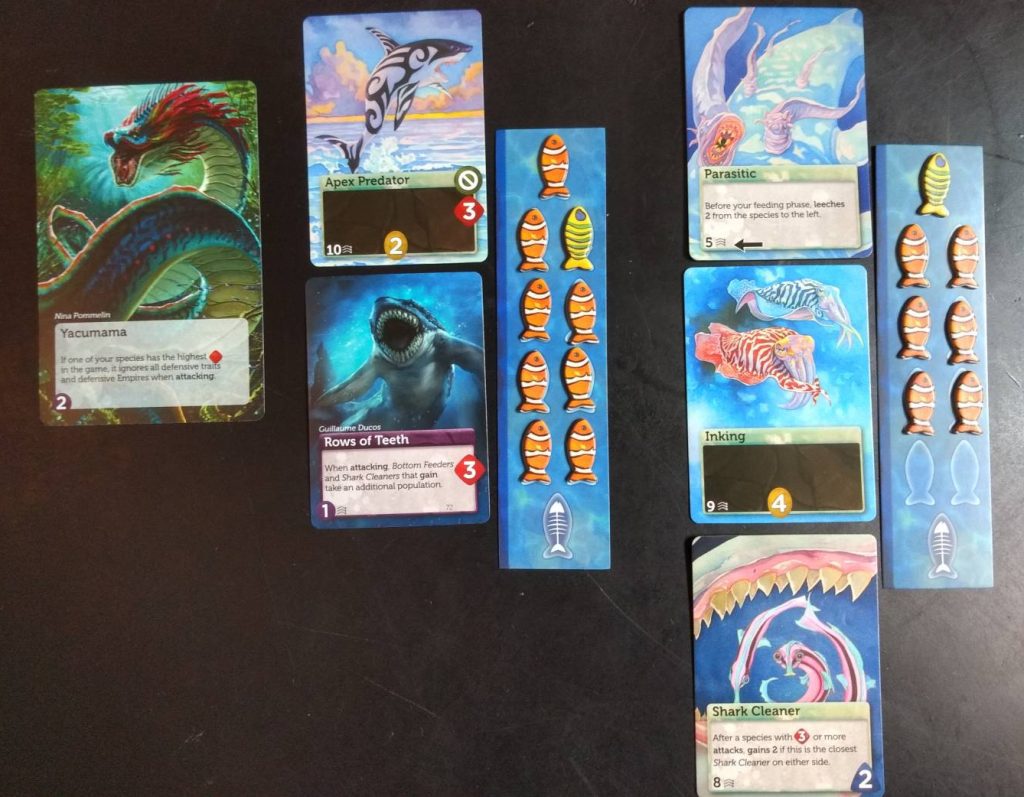
Some of these Legend cards are pretty freaking cool (as well as all being stunning, the artwork is exceptional).
The Dragon King lets you distribute population among all your species. Mishibizhiw lets you steal traits from extinct species. The Kraken Colony is a machine gun that lets you attack three times on the trot, whilst the Muldjewangk takes a shotgun approach, allowing you to also attack the immediate neighbours of any species you attack.
Amongst these headliners are Legends that let you break the rules in subtler but just as intriguing ways, including attacking the Reef, migrating population at will and siphoning population from other species when they feed.
And then there’s the Leviathan, which limits you to only one species but provides a starting attack score of 25 and has no limits on its traits or population. Brutal.
If it sounds like this is Oceans turned up to 11, in many ways that’s because it is.
Good Golly Myth Molly
One of the reasons I think Oceans is such a fantastic game is because it provides you with so much flexibility to create some amazing combinations of traits. Oceans is a workshop filled with hand tools and raw materials, allowing you to craft and tinker to your heart’s content. How you approach each game depends on your mood, interests and the other players. You can play the game without attacking once or you can act like it’s a fish-eat-fish world where there can be only one.
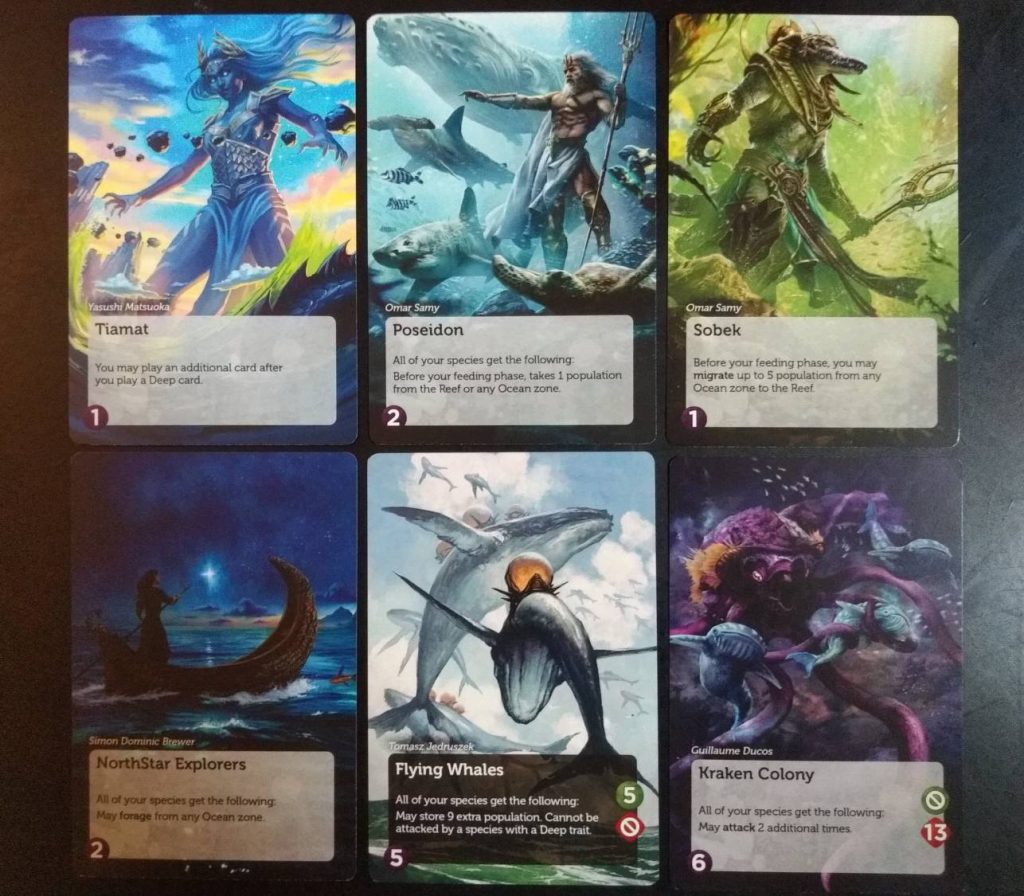
Legends of the Deep accentuates this, providing some meaty power tools to go with that screwdriver set. This addition of even more options and possibilities is glorious, opening the game to wilder inventions and interactions. Whilst you’re busy stockpiling population through absurd amounts of powered-up Gain symbols, Daniel is mainlining Deep cards, Lyra is creating the deadliest creatures ever imagined, and Lisa is quietly stealing population from everyone at every opportunity. It’s chaos but it feels good, if occasionally a little unfair when someone does something amazing and the game hasn’t quite gone your way. But even then it’s impressive to watch.
Fundamentally, it’s not all that different from the base game, but the effect of getting all your species playing to a strength is startling, particularly when someone brings one of the more specialised Legends into play and really leans in to it.
Myth Congeniality
In my review of the base game, I called Oceans a game of contradictions, and the same is true with the Legends of the Deep expansion.
The openness of Oceans can feel overwhelming for new players. For those feeling lost, the Legends provide a broad direction to aim for. It’s such an easy expansion to integrate that I’ve taught the game to new players with it included without a problem. In fact, the Legends helped them get started. Yacumama suggests you build a species with the highest attacking value in the game. Triton’s Merfolk want you to create as many species as possible. The Lobsterfolk need you to double down on the Gain symbols. Pick one and do that.
It’s a rare case of more rules increasing accessibility.
Myths of the Near Future
The titular Legends are awesome tools that expand the boundaries of what’s possible, whilst simultaneously narrowing your interest in exploring other possibilities. Another contradiction. If I got a lathe for my workshop, just imagine all the amazing new things I could create. They’d all involve rotation though…
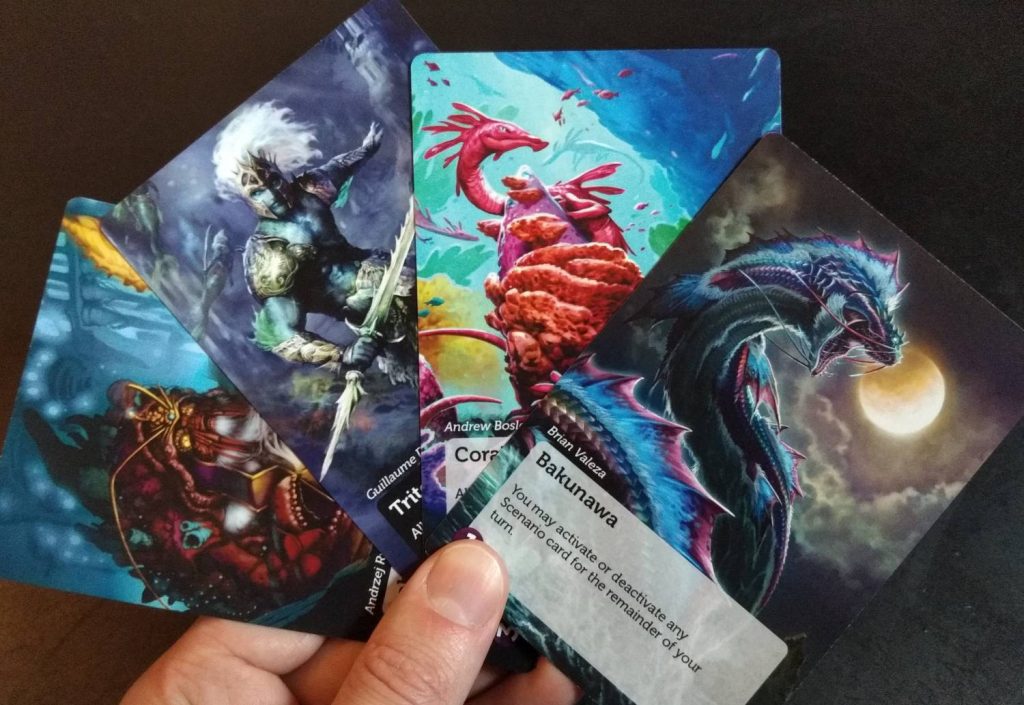
If you were limited to just one Legend card this would be a disaster (specially as they can make some of the Surface and Deep traits a little pointless). The masterstroke is allowing you to pay to swap them out during the game (none of the Legends are expensive and I’ve never held back from using them for fear of the cost in end game points). Some are more suited to the early stages, others shine best depending on what else is happening around the table. This flexibility matches the looseness of the main game, not only giving you cool new abilities but a choice of when, if and how to use them.
Whilst Legends of the Deep reminds me of the different aliens in Cosmic Encounter or the characters from Dale of Merchants Collection, this ability to chop and change at will sets it apart. You can return that lathe to the store and rent a jigsaw instead.
I Am Legend(ary)
My absolute favourite thing when playing Oceans is shuttling fish between ocean zones and triggering those scenario cards. When the stars align just right… Mwah, that’s a board game high!
Imagine my delight when I discovered Bakunawa, the moon-eating sea-serpent from the Philippines that allows you to activate and deactivate the scenario cards at will.
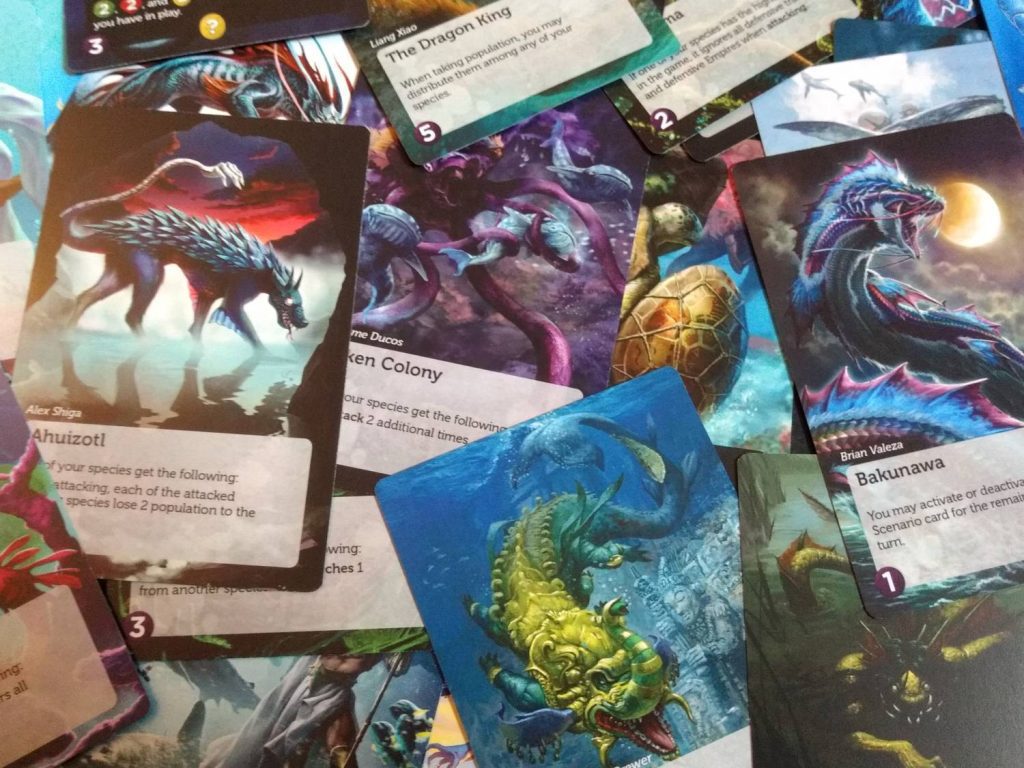
Except… if I put Bakunawa into play, then the pleasure I get from cleverly switching those scenario cards on and off at opportune moments disappears. Being able to do it almost every turn removes the mental reward, giving me the fish rather than teaching me to fish. The Legends can be absolutely wild to play with, but sometimes it’s not as satisfying to be handed something you’d normally have to have earned.
The God of Small Themes
Whilst the majority of ‘real world’ Legend cards are based on mythical creatures or deities from religions of ancient cultures, at least one remains important to people in the world today. Olokun is a spirit and deity in the Yoruba religion which is practiced in West Africa, and which is the basis of a number of other current religions, including Candomblé and Santería, both of which also recognise the divinity of Olokun.
Is Olokun’s presence in the game disrespectful to those religions and their followers? Honestly, I don’t know. I feel that she’s respectfully represented here and I’m glad the expansion gave me the opportunity to learn about her. At the same time, it would be a bit weird had deities such as Varuna or Jesus been represented on a Legend card, and having Olokun included alongside those flying whales as if they were on an equal footing is less than ideal.
Some-theme in the Water
When Legends of the Deep was originally announced there were significant grumblings about the ‘high fantasy’ theme. Those flying whales and a mention of Cthulhu (already a tired cliché in the tabletop world at the time) raised hackles amongst the evolution purists. The theme of this series of games matters to people.
Admirably, North Star Games reacted quickly to the criticism. Designer Dominic Crapuchettes re-focussed development on indigenous mythologies, issuing an invitation for fans to suggest the mythologies that interested them.
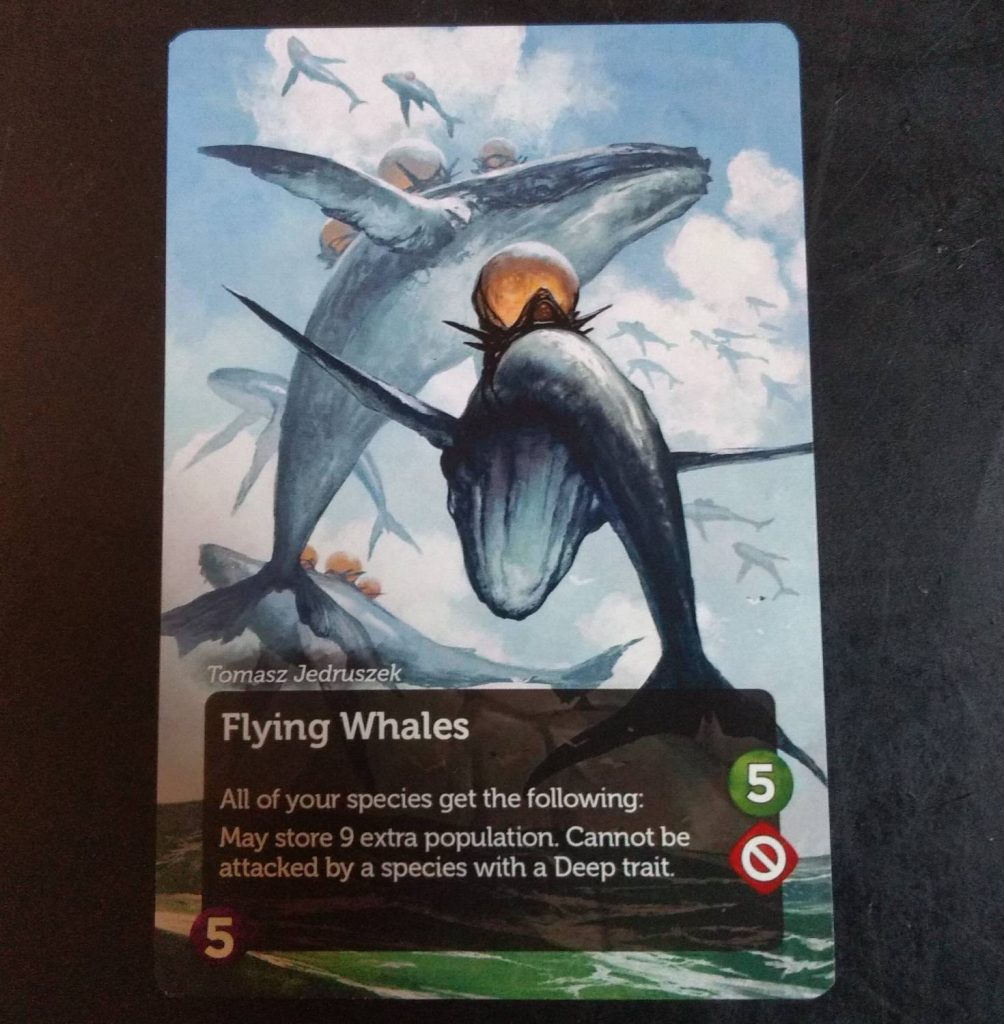
You can still feel the blueprints of those original designs, though, with the various ‘folk’ Legend cards (Turtlefolk, Lobsterfolk, etc.). I wish they’d excised them entirely and instead created a full set of 24 Legend cards based on mythologies from around the world. Here’s why:
Firstly, I love that in a game about evolution Crapuchettes has found a way to educate players about an entirely different topic. As I discussed at the top, I hadn’t a clue about most of these myths and it’s been a joy spending time learning more with the rulebook and online.
Secondly, the Legend cards based on real world mythologies are far more interesting than those ‘folk’ cards, in almost every regard. This is no slight on Crapuchettes and developer Ben Goldman – the various included myths have persisted in the world’s cultural memory for hundreds or even thousands of years. It’s hard for some turtles with a shield to compete with such historical depth and richness of storytelling.
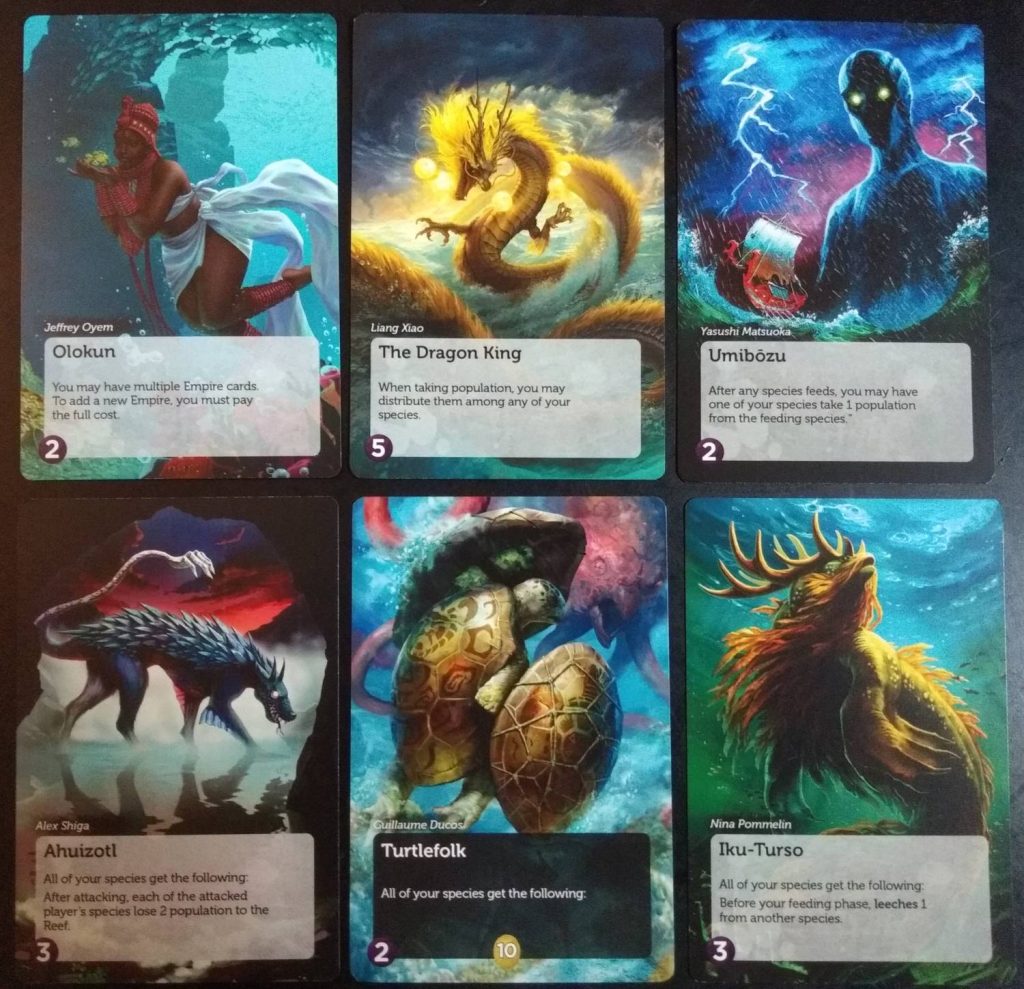
And finally, what the myth-based Legends say about the theme of Oceans is gloriously subversive. The great unspoken secret behind the Evolution series is that the players act as intelligent designers, deliberately creating species to fit the needs of an environment they themselves have made. The actual theme of evolution comes from the process of natural selection that occurs as your species compete for resources. With the myth-based cards, Legends of the Deep acknowledges this secret for the first time, letting you play as deities that create and curate species. It’s wonderfully cheeky.
Amongst the myth-based Legends, those in-house Legends like the flying whales are a little jarring, like stumbling upon the Deep promo card ‘Sparkles’ amongst all the barbels and mucus cocoons. Just like Sparkles (a sharing and caring cartoon narwhale and a favourite in the Holmes household), they’re perfectly good mechanistically, but would have been best kept as promo cards.
Keep Rollin’, Rollin’, Rollin’, Rollin’ (Uh) In The Deep
I’ve voiced a few criticisms of Legends of the Deep but really they’re all surface-level concerns. Legends of the Deep is a fantastic addition to Oceans, adding exciting new opportunities, increased accessibility and a bucketload of happy chaos. I’ll be including it in pretty much every game of Oceans I play from now on and I’ll also do my best to continue to ignore the way it blurs the distinction between myth and legend…
Oceans: Legends of the Deep is live on Kickstarter starting 1st November 2022 – find out more here.


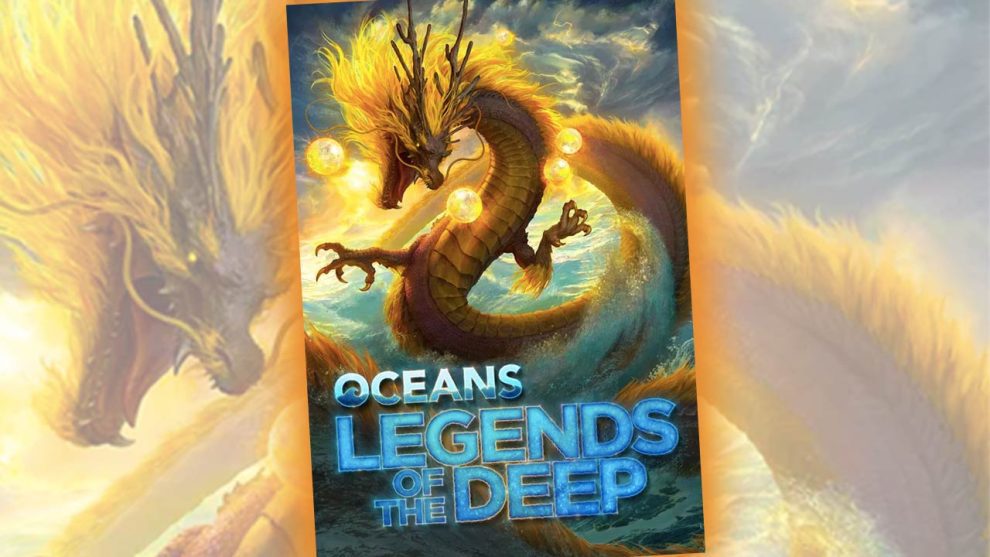

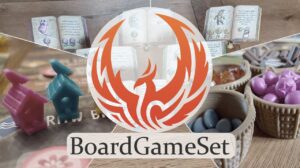
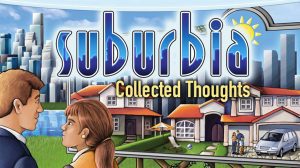

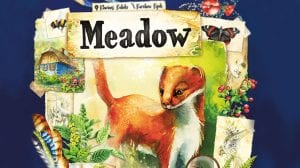




Playing “Ocean” was an immersive experience that felt like exploring the depths of the ocean. I loved the beautiful artwork on the board and the high-quality pieces. The game was challenging, as players had to balance building a diverse ecosystem with protecting it from hazards like pollution and overfishing. It was exciting to see how each tile affected the ecosystem, and I was constantly strategizing my moves to gain an advantage. Overall, “Ocean” was a fun and engaging game that I would recommend to anyone who loves board games and marine life.
https://boardgamesuniverse.com/how-to-beat-the-odds-in-oceans-the-board-game/
This Article motivates me about this game, aafter read it i knew very informative information about Ocean The Board Game